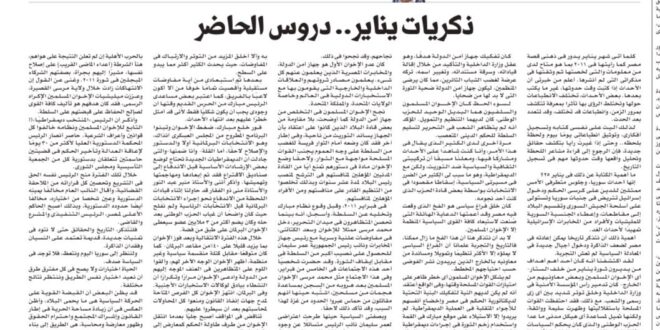January Memories… Lessons for the Present
By: Hossam Badrawi
Every January, Egypt’s story as I witnessed it in 2011 replays in my mind. With the information I had at the time, I summarized and documented those events in unpublished memoirs. My experience has taught me that writing events as they happen differs significantly from writing them in hindsight. Over time, perspectives may shift, new insights emerge, and impressions evolve, making the recording of events and feelings in the moment an essential part of documenting history.
Why write about January 25 now?
The relevance lies in what’s happening in Syria today—extremists once shunned now claiming religious authority, Israel roaming freely through Syria, seizing military assets, dividing the nation, and granting Syrian citizenship to militias and intelligence operatives as groundwork for future events.
It’s critical to reflect on this history to avoid repeating it in Egypt, especially with a new generation entering the political sphere, unacquainted with these experiences.
What happened in January 2011?
One of the main goals of those orchestrating the January revolution—whether the Muslim Brotherhood or foreign intelligence agencies like the CIA and MI6—was to dismantle Egypt’s internal security apparatus. This was achieved by sowing tension between the public and anyone in uniform. Yet, the military remained intact, confident, and inclined to assist any civilian structure other than the ruling National Democratic Party (NDP). The NDP controlled policies and elections but didn’t truly govern the country—a point for later discussion.
Dismantling State Security was a priority. By firing its leaders, looting its files, and renaming the agency, it became an easy target for revolutionary anger, satisfying those organizing the uprising. The result? State Security became one of the casualties of the revolution.
Unfortunately, the Muslim Brotherhood and Salafists were the only organized alternative to the NDP, with the resources and structure to capitalize on the vacuum. The public did not demonstrate in Tahrir Square to hand power to an extremist religious regime.
The political vacuum: Egypt’s great trap
The absence of a coherent political structure left Egypt vulnerable to chaos. The Brotherhood, with funding and international backing, was the best-organized entity to fill the void. History shows that no matter how powerful, security institutions cannot replace political structures. When a regime falls, its security apparatus often collapses with it, leaving a vacuum that the most organized and well-funded group will exploit—often aided by foreign powers seeking instability.
The Brotherhood had no intention of dismantling Egypt’s authoritarian system. They wanted to take over Mubarak’s position at the top, using revolutionary momentum to enact superficial democratic measures, with threats of street violence as their leverage. They succeeded.
Their primary target was State Security and Egyptian intelligence. The Brotherhood knew these agencies’ inner workings, their wealth sources, and international connections, especially with the U.S. and the U.K. They eliminated State Security with little resistance, exploiting revolutionary anger while avoiding direct confrontation with the military.
February 2011: A pivotal moment
Before Mubarak stepped down, secret negotiations occurred between the Brotherhood, represented by Mohamed Morsi and Saad El-Katatni, and intelligence chief Omar Suleiman. I personally attended a meeting on February 5 where Morsi represented the Brotherhood after escaping from prison—allegedly aided by armed militants, later confirmed to have ties to Hamas. I objected to Morsi’s presence as a fugitive in a political dialogue, but Omar Suleiman urged me to cooperate, emphasizing the delicate balance behind the scenes.
After this, I was excluded from further negotiations, as some of Mubarak’s inner circle viewed me as a threat to their interests.
The Brotherhood’s strategy
Following Mubarak’s resignation, the Brotherhood advocated for parliamentary elections first, followed by constitutional reform. Voices like mine, arguing for a framework of principles before elections, were sidelined. The dissolution of the NDP left over three million members politically homeless, handing the Brotherhood an easy parliamentary victory.
Once in power, the Brotherhood turned on protesters, accusing them of being foreign agents. They praised law enforcement, suppressing attempts at accountability. Their duplicity became evident as they transitioned from opposition to rulers.
When Morsi assumed the presidency, he circumvented constitutional norms, dismissed the general prosecutor, and consolidated power, granting himself legislative and judicial authority. His administration disregarded the rule of law, surrounded the Supreme Constitutional Court, and delayed rulings on key issues.
Lessons from history
We must remember these events to avoid repeating past mistakes. Syria’s turmoil offers stark warnings: political stability cannot rely solely on an oppressive security apparatus. True resilience lies in expanding freedoms within the rule of law, fostering civic participation, respecting rights, and ensuring accountability. This creates societal immunity against chaos and revolution, steering us away from scenarios like Syria.
Life is about choices. At every crossroads, we cannot keep choosing the same path and expect different outcomes.
 Dr. Hossam Badrawi Official Website
Dr. Hossam Badrawi Official Website


